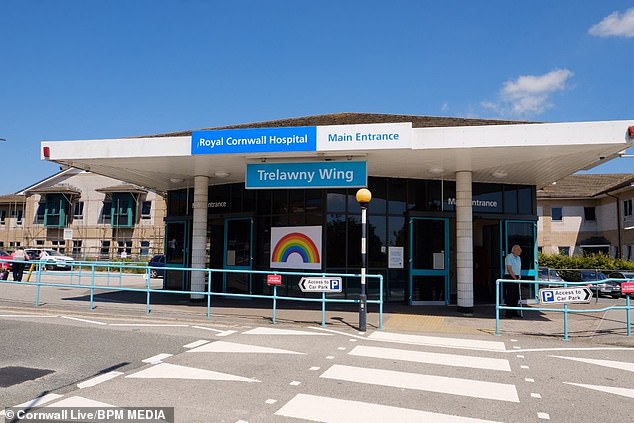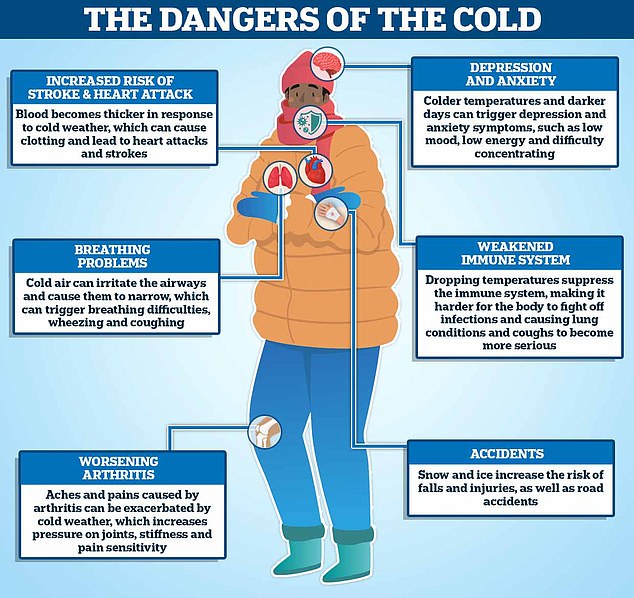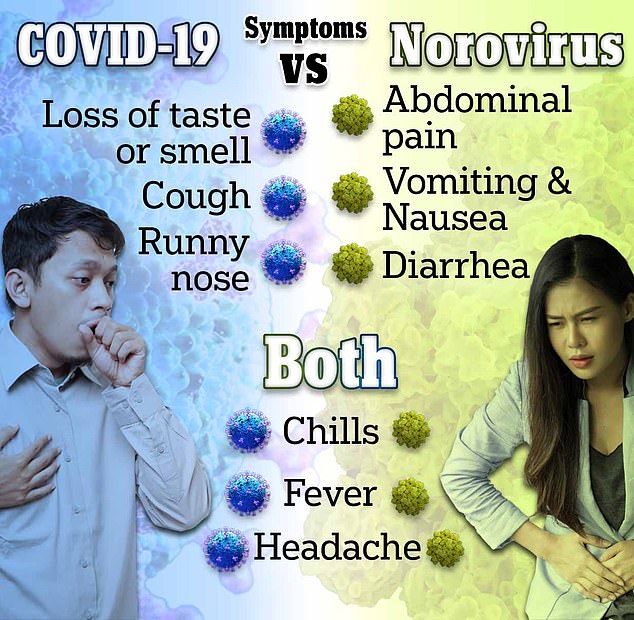NHS FLU CRISIS: Now nine hospitals reporting critical incidents as infections rise to ‘exceptionally high’ levels – with patients waiting 50 HOURS
Nine hospitals have reported critical incidents after flu cases ‘skyrocketed’ over the Christmas period, leaving some patients waiting 50 hours to be seen.
More than 5,000 patients were admitted to hospital with the infection over the Christmas and New Year period, according to NHS data.
Last week, there were an average of 4,469 patients with flu in hospital every day – almost 3.5 times more than in the same week last year – of which 211 were in intensive care.
The news comes amid a wave of other winter infections, including norovirus, respiratory syncytial virus (RSV), hMPV, a little-known common cold virus that is sweeping China and staggering its health care system – and now also affecting Britain and America .
University Hospitals Birmingham is the latest NHS Trust to declare a critical incident across all its hospitals: Heartlands in Bordesley Green, the Queen Elizabeth in Edgbaston, Good Hope in Sutton Coldfield and Solihull.
A spokesperson said an ‘exceptional number’ of flu patients admitted in the first week of January – a total of 311 hospital patients – was the reason for the move.
Measures, including wearing of masks, have been introduced in all departments, it added.
Previously, University Hospitals Plymouth NHS Trust sounded the alarm due to a ‘significant and increasing demand for hospital care.’
Patients at Liverpool Royal Hospital (pictured) have been told to visit their GP or call 111 as large numbers of people go to A&E unless there is an emergency.
The Trust said more than 300 people attended A&E at Derriford Hospital yesterday and almost 200 of them required admission for hospital care.
“We are mainly seeing large numbers of older patients with respiratory problems that are exacerbated by the cold weather,” a statement said.
It comes after Hampshire Hospitals NHS Foundation Trust declared a critical incident this morning and called on members of the public to help manage the ongoing crisis.
The Trust said this was due to ‘ongoing pressures’ at Basingstoke and Winchester hospitals, including high admission rates, high numbers of infectious patients requiring isolation and a low discharge rate.
Meanwhile, the Royal Liverpool University Hospital has said staff were working incredibly hard to treat patients suffering from ‘flu and respiratory illnesses’.
Covid-19, RSV and norovirus surged in December as health chiefs warned this winter could be one of the worst on record.
And there are warnings of continued pressure as we move into 2025, with orange cold warnings for England as temperatures are expected to drop below freezing.
Liverpool University Hospitals NHS Foundation Trust has urged people to only go to A&E in the event of a genuine medical emergency, and instead ask them to visit their GP or call 111.
A spokesperson said the hospital was ‘extremely busy’ as it treated an increasing number of patients suffering from flu and other respiratory illnesses.
Yesterday the hospital said its emergency department was ‘at full capacity’, with patients reporting huge waiting times.
A spokesperson said: ‘Given the exceptionally high demands on our Emergency Department, particularly with flu and respiratory conditions, and the number of patients we have taken this action to support the safe care and treatment of our patients, which is our absolute priority is.’

The Royal Cornwall Hospital, pictured, says its services were under ‘significant pressure’ after a critical incident was reported
Patients are encouraged to use other services such as their GP, a local pharmacy or a walk-in centre.
‘The NHS 111 service can be used to identify the most suitable service for you and avoid long waiting times,’ she added.
‘When visiting our emergency department, patients and visitors should follow a number of additional infection control measures to prevent the spread of winter viruses such as influenza and norovirus.
‘This includes practicing good hand hygiene, only visiting areas that are necessary in our hospitals and wearing masks in clinical areas when requested.’
Earlier today, leading British virus experts called on Chinese authorities to release vital information about a worrying outbreak of hMPV, a cold-like virus that is reportedly overwhelming hospitals.
British authorities “need more information about the specific strain circulating” to accurately assess the threat to the British public, virus expert Dr Andrew Catchpole has warned.
Cases of the infection – which causes cold symptoms – are rising across Britain, with graphs showing a doubling of numbers in the past month.
Worryingly, this is mainly driven by cases in young children – who are among the most vulnerable to serious complications – official data shows.
It comes after the Royal Cornwall Hospital also declared a critical incident last week and said its services were under ‘significant pressure’.
Bosses made the decision on Friday evening after a week of sustained pressure on the main hospital and emergency department.
Kate Shields, CEO of the NHS Cornwall and Isles of Scilly Integrated Care Board said: ‘We are currently seeing a large number of ambulances waiting outside the Royal Cornwall Hospital and patients in our emergency department.
‘There are also a large number of patients in Cornwall’s hospitals who are medically fit to be discharged but are waiting for appropriate care.
‘By reporting a critical incident, the NHS can take additional, immediate steps to build capacity, help discharge patients, relieve pressure on our emergency department and release ambulances and their crews.’
She continued: ‘We urgently need the public’s support to ensure we can see those who are sickest and in greatest need. Only come to the emergency department if there is a life-threatening emergency.
‘There are other NHS services available and we encourage you to take advantage of them where possible. These include our network of minor injuries units, our urgent treatment center at West Cornwall Hospital, out-of-hours GP services, local pharmacies and NHS 111.”
Yesterday the government announced plans that will see millions more NHS patients receive free treatment in private hospitals in a bid to cut waiting lists.
The Prime Minister pledged to make ‘better use’ of the private sector so sick patients can be seen more quickly for a range of problems.
GPs will be forced to actively tell patients when they can have their scans, tests or operations in private clinics.
And appointments are booked through an updated NHS app or website, which tells users their expected waiting times at each NHS and private provider, the distance from their home and their quality of care ratings.


Norovirus can resemble the symptoms of Covid, with both viruses causing chills, fever and headache
Patients can then choose between the two, with taxpayers footing the bill regardless of the option chosen.
Critics have questioned how the additional appointments will be accomplished given the country’s shortage of health care workers.
The policy is expected to see the number of private sector appointments increase by at least a fifth every year, from 5 million to more than 6 million.
It means private providers are likely to pocket £2.5 billion in government funding every year – taking their annual income from the Department of Health and Social Care to almost £16 billion.
Health chiefs have previously warned that Britain is seeing a ‘skyrocketing’ flu infection as data shows flu hospital admissions are quadrupling compared to a month ago.
Figures show that last week alone, more than 4,500 beds were occupied every day by flu patients, 3.5 times more than in the same week last year.
Of these, 211 were in intensive care – an increase of 69 percent from the previous week.
More than 4,100 Britons also spent Christmas Day in hospital with flu. By December 29, this had risen to more than 5,000.
Meanwhile, numbers of winter-vomiting norovirus are also 40 percent higher than expected for this time of year.
Health chiefs fear the ‘extreme’ and ‘dangerous’ cold snap set to hit Britain this weekend will continue to pile pressure on already overburdened hospitals.
Professor Julian Redhead, NHS national clinical director for urgent and urgent care, said: ‘These latest figures show that the burden of flu had far from subsided before we entered the new year, skyrocketing to more than 5,000 cases per day in hospital as of 2011. late last week and rising at a very worrying rate.
‘In addition to flu, there is also ongoing pressure from Covid, while hospital cases with RSV and norovirus are also higher than last year, with hospitals adding 1,300 more beds last week than the same period last year, in anticipation of this continued pressure from viruses and other requirements.
‘With what looks like an extreme cold snap expected across England this weekend, we know the low temperatures could be dangerous for those who are vulnerable or have breathing problems.
‘So if you are at risk, try to stay warm and make sure you stock up on regular medicines.
‘Continue to use NHS 111 and 111 online if you need advice and support for health problems, and only use 999 or go to A&E in life-threatening emergencies.’
